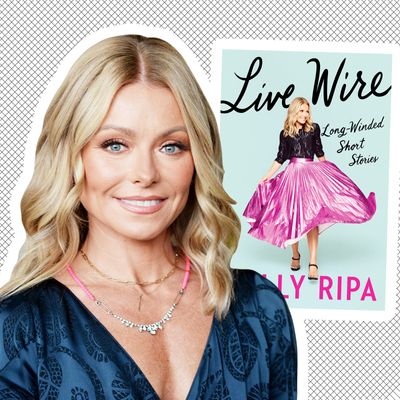
Kelly Ripa has been telling stories every morning for more than 20 years as co-host of Live! Now she’s doing it from your bookshelf with her first book, Live Wire, out today.
Rather than the memoir that some might expect, Ripa’s debut is a collection of personal essays — a natural extension of the conversational tone viewers are used to hearing over coffee. Except on paper, Ripa digs deeper. The collection is filled with relatable stories like dropping her kids off at college and becoming an empty nester, unrelatable stories like saving a woman’s life with Richard Gere at Jimmy Buffett’s house, and a healthy sprinkling of behind-the-scenes peeks at Live!
Essays on the morning talk show give Ripa the chance to finally set the record straight on a few misconceptions. “I think there was an assumption that I just woke up one day and went into my fancy job,” she says, (pronouncing it fawncy), “then everything was an easy path and it was all handed to me, and I think that this book dispels that.” In reality, the path was tumultuous, and she writes in depth about her contentious hiring, the false narrative that she cut contact with Regis Philbin after he left the show, and the misogynistic, toxic work environment that she was subjected to for years.
“That’s really what this book is,” Ripa says. “Instead of looking at one aspect of a canvas, it’s zooming out and looking at the wider picture.”
You write at the beginning about how this was decidedly not a memoir. Why a collection of personal essays?
I read a lot, so I know that there’s this saturation right now of everybody sharing everything, because everyone was shut down from life and had time on their hands. So what I thought I would do is offer bits and pieces in essays that are individually digestible and offer a little hope, a little wisdom, a skosh of advice. It gives you insight into my life, what it took to get where I am, and how the road was not easy.
The book covers some of the behind-the-scenes complexities of Live! including the combative dynamic between ABC and WABC over who controlled the show. When you were hired, for example, you say the network wanted you, but the show didn’t. What kind of work environment did that result in during those early days?
I was terrified to begin with — just coming out of my comfort zone. As an actor, you never break the fourth wall, and as a talk-show host, you only break the fourth wall. Dealing with a live audience took a lot of getting used to; it was a unique thing to have immediate response. Then playing a character versus being yourself. It was a high-wire act. Then the behind-the-scenes of: “No, you don’t talk to them; you only talk to us.” “This person is your immediate superior, not that person you’ve always dealt with.” “You don’t talk to your agent; you come to us first.” It was a lot of jigsaw-puzzling, and no one ever sat me down and said, “Okay, look, this is how it is, just so you know.” I had to learn that on my own.
You write that when Regis left, you found out that seniority was a “masculine word.” From the outside, it looked like it was now your show: You switched chairs, your name was first in the title, and so on. But what about your role actually changed in a real way?
Nothing changed. At all. It was exactly the same. I wanted an office, and I was told that they were holding the office that had been vacated for the new guy. And I just said, “That’s not acceptable. That’s not okay.” Meanwhile, they didn’t have a new guy! I was the new guy. I fought for and got an office. But it’s something I’ve never seen any man that I’ve worked with have to do. So it was with that scenario in mind that I wrote that seniority is a masculine word. Because I could not achieve it. Anything I had done before did not count as seniority, and that was a tough pill to swallow.
You were told that your hiring wasn’t Regis’s choice to make. Was that still the case when you were the one in the market for a new co-host?
I think the big misconception is that the host hand-selects the co-host, and the host really has nothing to do with the co-host selection process. I think a lot of it comes down to chemistry, and chemistry is not for the person in the scenario to judge. It’s a much bigger decision with network people, and I don’t know how it works. I wasn’t brought into the process. It wasn’t up to me, and it wasn’t up to Regis.
What was going through your head when Regis announced on air that he was leaving the show?
It’s still an out-of-body experience thinking back to it. I remember looking at Lori Schulweis — one of our producers, and I would consider her the closest person to Regis — because I thought, This is one of those scenarios where everyone knew except for me. I looked at her, and she was sobbing. And that’s when I knew that nobody knew. I had been told backstage about three minutes before we went on the air that he was going to make a big announcement, and he’d told Gelman and me, along with our station manager at the time, what it was, but we really thought that he was kidding. When it came out of his mouth, it was a total out-of-body experience and a terrifying one.
It seems like the monologue you delivered about respect in the workplace in 2016 wasn’t just about that one incident but a very long time coming. Did you finally see meaningful change after that?
You know, everybody says that that moment came about a year or two too soon to really be appreciated. I have to say, there was a woman named Debra O’Connell who took over as our station manager, and she’s now basically running everything over at Disney. She came in, and that’s when I saw a monumental shift in the entire culture of the workplace. I saw a shift in the way things were done, the way people were included in conversations, and this veil of secrecy and closed-door meetings seemed to evaporate.
After 20 years of Live! I imagine your kids are somewhat used to being the subject of stories, but were there any family conversations about what could and couldn’t be in the book?
I was really mindful. Michael is the only one of my three kids who has read the book, and he was surprisingly emotional about it. He’s my big reader, and he was very receptive. I would read it to Lola, but then it got oppressive with her edits. So eventually, I just said, “Okay, I’m just going to send the chapters in advance to Mark.” Mark, my husband, is really the one who has any pre-edit approval in this, because the kids are going to hate everything you write and say about them.
When you left All My Children, you write that it was a decision you came to with the help of the “time-versus-money matrix.” What’s the driving force behind the career decisions you make today?
It’s exactly the same: the time-versus-money matrix, even though my children are grown. I always say that I will figure out a way to make money. I’ve always been scrappy and nimble, and I don’t have an ego about things — besides this book, which feels very much like the id on display. But I’ve always just been a worker bee. Having said that, there comes a time when you figure out — and I figured it out young in my life, because I had kids young — that they aren’t making more time. Time is a precious commodity. They don’t make more of that.
This interview has been edited and condensed.


